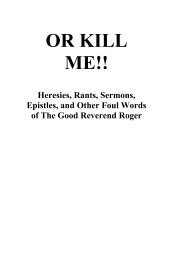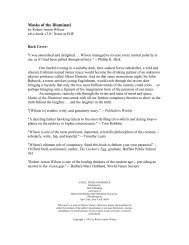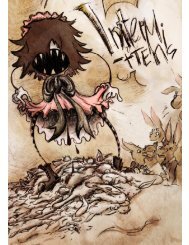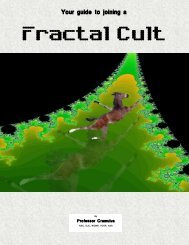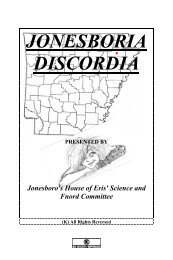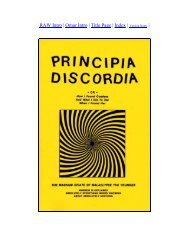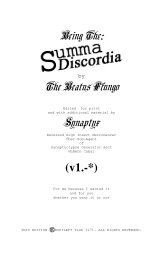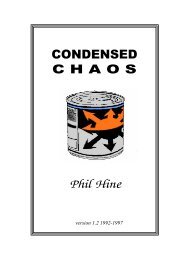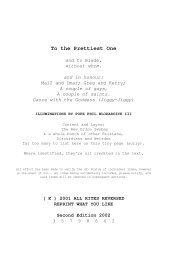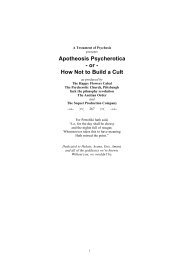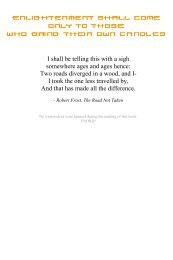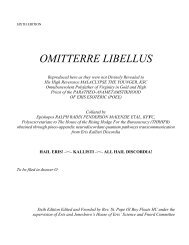Coincidance - Principia Discordia
Coincidance - Principia Discordia
Coincidance - Principia Discordia
Create successful ePaper yourself
Turn your PDF publications into a flip-book with our unique Google optimized e-Paper software.
COINCIDANCE 91<br />
Concretely, Bloom earns his living cadging ads for a newspaper; on 16<br />
Tune 1904, he is trying to secure an ad for Alexander Keyes, whose company<br />
logo is a pair of crossed keys, suggesting the Coat of Arms of the Isle of Man.<br />
With typical Irish indirection, Mr. Keys is also advertising his loyal<br />
Parnellism: the House of Keys on the Isle of Man is the local parliament,<br />
independent of England, and Parnell's "Home Rule" party used that example<br />
as an argument that the Irish were entitled to their own parliament also.<br />
Symbolically, the crossed keys indicate everything associated with Celtic<br />
crosses, Christian crosses, Egyptian Tau-crosses and all crossed emblems of<br />
rebirth; and the Isle of Man symbolizes humanity's isolation and solidarity at<br />
once (another Joycean paradox): every man is an island, but we are all<br />
crossed or linked with each other, as Stephen Dedalus and Leopold Bloom<br />
are crossed and linked in ways neither understands. (It is no accident that<br />
the first sentence of Ulysses has 22 words, one for each letter of Cabala, and<br />
that the last is "crossed.")<br />
Indeed, Ulysses is made up of crossed keys in time as well as in space. In the<br />
first chapter, Stephen Dedalus broods on his agenbite of inwit, eats<br />
breakfast, and replies with dry, bitter wit to the more robust, blasphemous<br />
and outrageous jokes of Buck Mulligan. Only when we discover the parallelism<br />
of Homer's Odyssey that explains Joyce's title do we realize that Stephen is<br />
reliving the experiences of Telemachus, who at the beginning of the Odyssey<br />
awakens in a tower, as Stephen does, and is mocked and bullied by<br />
Antonioos as Stephen is mocked and bullied by Mulligan. When Stephen, in<br />
chapter two, is given pompous and pontifical advice by the Ulster<br />
Protestant, Mr. Deasy, we are again watching trans-time synchronicity:<br />
Telemachus was similarly given advice by Nestor in the similar section of<br />
the Odyssey. The parallels follow throughout: Bloom is Ulysses, Molly is<br />
Penelope, the Catholic Church is the island of the lotus eaters, the<br />
newspaper office where everybody quotes their favorite political speeches is<br />
the Cave of Wind, etc. Dead and absent for 3000 years, Homer's images are<br />
alive and present, in some sense, in Dublin.<br />
In what sense (as the impatient may ask)? Is Stephen literally the reincarnation<br />
of Telemachus and Bloom of Ulysses? Or is the connection one of<br />
Jungian synchronicity (not yet discovered when Joyce wrote Ulysses)? Or<br />
might one posit Dr. Sheldrake's morphogenetic resonances in time? Joyce<br />
does not answer. He exhibits the living presence of the absent dead and lets<br />
us draw our own conclusion.<br />
That the simple models of reincarnation or metempychosis* will not quite<br />
*Which is deliberately hinted at by Joyce in Chapter 4, when Molly asks Bloom the<br />
meaning of "met-him-pike-hoses" and Bloom tries to explain "the transmigration of<br />
souls" to her.



